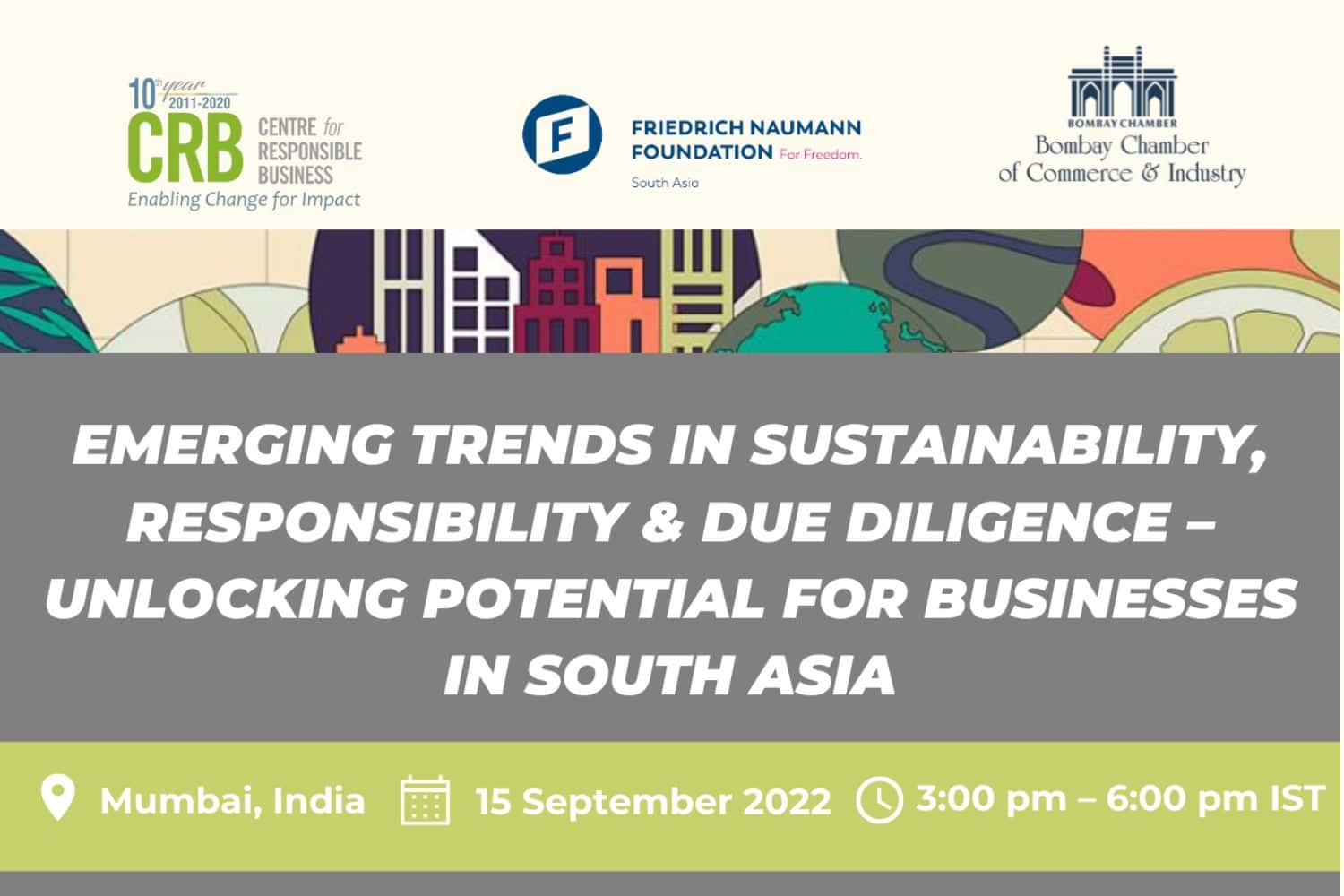Bombay Chamber of Commerce & Industry jointly with Centre For Responsible Business and Friedrich Naumann Foundation for Freedom is organising a panel discussion on the Emerging Trends in Sustainability, Responsibility & Due Diligence – Unlocking Potential for Businesses in South Asia.
Emerging Trends in Sustainability, Responsibility & Due Diligence – Unlocking Potential for Businesses in South Asia

Emerging Trends in Sustainability, Responsibility & Due Diligence – Unlocking Potential for Businesses in South Asia
Background of Session :
South Asian businesses play a significant role in the global market. The Asian supply chains as a whole is expected to account for at least 40 percent of the global economic output by 2030. Given the issues brought forth with the Covid-19 pandemic and in furtherance to Sustainable Development Goals (SDGs) and the UN Guiding Principles, multiple States have (or are in the process) tabled laws pertaining Environment and Business & Human Rights (BHR) due diligence across supply chains. The laws mandate businesses (of a certain threshold) to assess actual and potential environment and human rights impacts of their business operations through downward supply chains. Some of the States proactively endorsing such laws are Germany, Norway, Netherlands, France, United Kingdom, Australia, Japan, Thailand, Malaysia, Kenya and so on. The institutional investors have also moved from traditional style of investing to investing in businesses that demonstrate principles of human rights, environment and good governance across operations. In 2021, the Environment Social Governance (ESG) inflow stood at a voluminous estimate of at least USD 330 Billion. As per the 2021 EY Global Investor Survey, 74 percent of institutional investors were likely to ‘divest’ based on poor ESG performance indicators. South Asian States have also undertaken initiatives to reflect the ethos of responsibility, resilience and due diligence. For instance, in India SEBI has mandated filing of Business Responsibility & Sustainability Report by top 1000 companies (market capital) by FY 2023. The Sri Lankan apparel industry has launched a campaign in the garment sector, ‘Garment without Guilt’. Sri Lanka is the only Asian State to have signed 39 ILO Conventions. Pakistan in 2021 released its first National Action Plan on Business and Human Rights to encourage long term and sustainable economic growth. Bangladesh has launched multiple initiatives towards safety, health and occupation such as the Accord on Fire and Building Safety, the Alliance for Bangladesh Worker Safety and the RMG Sustainability Council in its most thriving sector – the garment sector. Given the changing landscape in regulatory frameworks and expectations across supply chains, it becomes pertinent to simplify and understand the potential impacts of the same on South Asian businesses. Further, given the prominent role of the South Asian businesses, it becomes relevant to discuss ways of using this change to its competitive advantage.
The purpose of this panel discussion is to deliberate on the emerging global trends and expectations and assess the preparedness of South Asian businesses. The Panel will elaborate on the global shift and focus on human rights and environment impacts in business operations and reflect on ways businesses can enhance competitiveness with respect to ESG indicators and thereby amplify market access and investments.
Objective :
- Discuss emerging policy landscape, trends and expectations on environment and human rights due diligence
- Deliberate on opportunities, challenges and advantages for South Asian businesses
- Discuss pragmatic ways of making South Asian businesses more competitive and resilient
Kindly note that this session is only for below Targeted people such as :
- CEO, Managing Director & Chairperson
- CSO, Sustainability Head and teams ( Public and private Sector )
- Founders
- Executive Director
- Sr. Advisor, Sr. Director, Director (sustainability & HR)
- Chair, Chair ISA, Global Taskforce for Foundations, Independent Director Linde, India
- Partner, Leader – Sustainability & Climate Change
- Professionals and consulting organisations
Kindly note Participation is Free But Registration is mandatory. Only Registered Participants will get entry for the Session :
Contact Details :
Ms. Aneeha Neeraja Rajan
Email : aneeha.rajan@bombaychamber.com
Tel – 61200227, 9987211804
Additional Details
Organizer name -
Venue Name - Taj President, 90 Cuffe Parade, Mumbai, Maharashtra - 400005
Event Fees Type
free_event
Event or Seminar - Workshop








